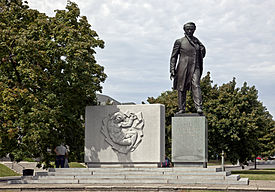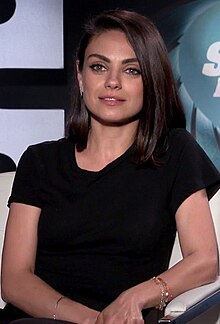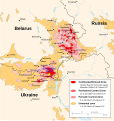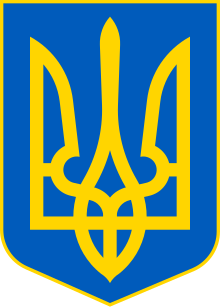Portal:Ukraine
The Ukraine Portal - Портал України
Ukraine Україна (Ukrainian) | |
|---|---|
| ISO 3166 code | UA |
Ukraine is a country in Eastern Europe. It is the second-largest European country after Russia, which borders it to the east and northeast. Ukraine also borders Belarus to the north; Poland and Slovakia to the west; Hungary, Romania and Moldova to the southwest; and the Black Sea and the Sea of Azov to the south and southeast. Kyiv is the nation's capital and largest city, followed by Kharkiv, Dnipro, and Odesa. Ukraine's official language is Ukrainian.
Humans have inhabited Ukraine since 32,000 BC. During the Middle Ages, it was the site of early Slavic expansion and later became a key centre of East Slavic culture under the state of Kievan Rus', which emerged in the 9th century. Kievan Rus' became the largest and most powerful realm in Europe in the 10th and 11th centuries, but gradually disintegrated into rival regional powers before being destroyed by the Mongols in the 13th century. The area was then contested, divided, and ruled by a variety of external powers for the next 600 years, including the Grand Duchy of Lithuania, Polish–Lithuanian Commonwealth, the Austrian Empire, the Ottoman Empire, and the Tsardom of Russia.
The Cossack Hetmanate emerged in central Ukraine in the 17th century but was partitioned between Russia and Poland before being absorbed by the Russian Empire in the late 19th century. Ukrainian nationalism developed and, following the Russian Revolution in 1917, the short-lived Ukrainian People's Republic was formed. The Bolsheviks consolidated control over much of the former empire and established the Ukrainian Soviet Socialist Republic, which became a constituent republic of the Soviet Union in 1922. In the early 1930s, millions of Ukrainians died in the Holodomor, a human-made famine. During World War II, Ukraine was occupied by Germany and endured major battles and atrocities, resulting in 7 million civilians killed, including most Ukrainian Jews.
Ukraine gained independence in 1991 as the Soviet Union dissolved and declared itself neutral. A new constitution was adopted in 1996 as the country transitioned to a free market liberal democracy amid endemic corruption and a legacy of state control. The Orange Revolution of 2004–2005 ushered electoral and constitutional reforms. Resurgent political crises prompted a series of mass demonstrations in 2014 known as the Euromaidan, leading to a revolution, at the end of which Russia unilaterally occupied and annexed Ukraine's Crimean Peninsula, and pro-Russian unrest culminated in a war in Donbas with Russian-backed separatists and Russia. Russia launched a full-scale invasion of Ukraine in 2022. (Full article...)
In the news
- 26 January 2025 – Russian invasion of Ukraine
- Velyka Novosilka offensive
- Russian forces capture the village of Velyka Novosilka. (Mathrubhumi)
- 24 January 2025 – Russian invasion of Ukraine
- Attacks in Russia during the Russian invasion of Ukraine
- A Ukrainian drone strike targets an oil refinery in Ryazan Oblast, Russia, in one of the largest Ukrainian drone attacks inside Russia of the conflict to date. The Russian military says it shot down at least 121 drones over 13 regions overnight. (BBC News)
- Kyiv strikes
- A Russian drone strikes a ten-storey apartment building in Fastiv, Kyiv Oblast, killing at least three people. (Euronews)
- Mobilization in Ukraine
- Ukraine finalizes military reforms aimed at recruiting 18- to 25-year-olds to the armed forces, penalizing draft dodgers, and lowering the minimum compulsory military service age to 25 from 27. (The Kyiv Independent)
- The Ukrainian Coordination Headquarters for the Treatment of Prisoners of War announces that, with assistance from the International Committee of the Red Cross, the bodies of 757 Ukrainian soldiers have been returned to Ukraine. (The Kyiv Independent)
- 24 January 2025 – 2025 Slovak protests
- Over 60,000 people demonstrate across Slovakia in protest of Prime Minister Robert Fico's anti-Ukrainian, pro-Russian, and Eurosceptic policies. (AP)
Featured pictures
Did you know (auto-generated)

- ... that the diary of Erich Lassota von Steblau is an important primary source on the 16th-century Zaporozhian Cossacks of Ukraine?
- ... that Inna Derusova was the first woman to be posthumously awarded the title of Hero of Ukraine?
- ... that Sarah Ashton-Cirillo, covering the Russian invasion of Ukraine, said that Ukrainians care less about her being transgender than Americans do?
- ... that 30 Ukrainian anarchists defeated more than 500 Austrian imperial soldiers at the Battle of Dibrivka?
- ... that Love, a sculpture by Ukrainian artist Alexander Milov, represents two wire-frame adults who appear to be alienated, but inside their bodies two children reach out to each other?
- ... that Anatolii Brezvin helped establish a youth hockey championship in Ukraine, and sought to open 60 ice rinks?
More did you know -
- ... that the Khreschatyk is the main street of Ukrainian capital Kyiv on which Orange Revolution and other historical events mainly took place?
- ... that Vasyl Avramenko is often referred as "The father of the Ukrainian dance"?
- ... that Ukrainian composer Mykola Leontovych (pictured), known for the "Carol of the Bells", was nicknamed "Ukrainian Bach" in France?
- ... that journalist Savik Shuster who used to work for Russian TV channels now prefers to work for the Ukrainian TV because he felt the Russian Government was limiting his journalistic freedom?
- ... that among many historic landmarks at the Andrew's Descent in Kyiv, there is a medieval Gothic style castle that locals call the "Castle of Richard the Lion Heart" due to the legend the 12th century King of England had visited the building?
- ... that Ukrainian naturalist, lecturer, artist and author John Lhotsky was credited as the first discoverer of gold in New South Wales?
Selected article -
The politics of Ukraine take place in a framework of a semi-presidential republic and a multi-party system. A Cabinet of Ministers exercises executive power (jointly with the president until 1996). Legislative power is vested in Ukraine's parliament, the Verkhovna Rada (Ukrainian: Верховна Рада, lit. 'Supreme Council').
As part of the Soviet Union as the Ukrainian Soviet Socialist Republic until 1991, the political system featured a single-party socialist-republic framework characterized by the superior role of the Communist Party of Ukraine (CPU), the sole-governing party then permitted by the Ukrainian SSR's constitution. In 1996, the current constitution replaced the previous constitution that was introduced in 1978. (Full article...)
In the news
- 26 January 2025 – Russian invasion of Ukraine
- Velyka Novosilka offensive
- Russian forces capture the village of Velyka Novosilka. (Mathrubhumi)
- 24 January 2025 – Russian invasion of Ukraine
- Attacks in Russia during the Russian invasion of Ukraine
- A Ukrainian drone strike targets an oil refinery in Ryazan Oblast, Russia, in one of the largest Ukrainian drone attacks inside Russia of the conflict to date. The Russian military says it shot down at least 121 drones over 13 regions overnight. (BBC News)
- Kyiv strikes
- A Russian drone strikes a ten-storey apartment building in Fastiv, Kyiv Oblast, killing at least three people. (Euronews)
- Mobilization in Ukraine
- Ukraine finalizes military reforms aimed at recruiting 18- to 25-year-olds to the armed forces, penalizing draft dodgers, and lowering the minimum compulsory military service age to 25 from 27. (The Kyiv Independent)
- The Ukrainian Coordination Headquarters for the Treatment of Prisoners of War announces that, with assistance from the International Committee of the Red Cross, the bodies of 757 Ukrainian soldiers have been returned to Ukraine. (The Kyiv Independent)
- 24 January 2025 – 2025 Slovak protests
- Over 60,000 people demonstrate across Slovakia in protest of Prime Minister Robert Fico's anti-Ukrainian, pro-Russian, and Eurosceptic policies. (AP)
Selected anniversaries for January

- January 3, 1681 — Treaty of Bakhchisarai was signed by Russia, the Ottoman Empire, and the Crimean Khanate at the conclusion of the Russo-Turkish War (1676–1681).
- January 10, 1992 — the Ukrainian karbovanets replaced the Soviet ruble at par, with the ISO 4217 code being
UAK. - January 15, 1967 — David Burliuk, an avant-garde artist, died in Long Island, New York.
- January 22, 1919 — The Act Zluky was signed, unifying the Ukrainian People's Republic and the West Ukrainian National Republic.
- January 23, 2005 — Ukrainian president Viktor Yushchenko was inaugurated into office after winning the second run-off elections in late 2004.
- January 29, 1918 — Battle of Kruty takes place between the Ukrainian People's Republic and Bolshevik forces.
Photo gallery
Related portals
Religions in Ukraine
Post Soviet states
Other countries
WikiProjects and collaborations
Associated Wikimedia
The following Wikimedia Foundation sister projects provide more on this subject:
-
Commons
Free media repository -
Wikibooks
Free textbooks and manuals -
Wikidata
Free knowledge base -
Wikinews
Free-content news -
Wikiquote
Collection of quotations -
Wikisource
Free-content library -
Wikiversity
Free learning tools -
Wikivoyage
Free travel guide -
Wiktionary
Dictionary and thesaurus
New articles
Ukrainian editions of Wikimedia projects
































































